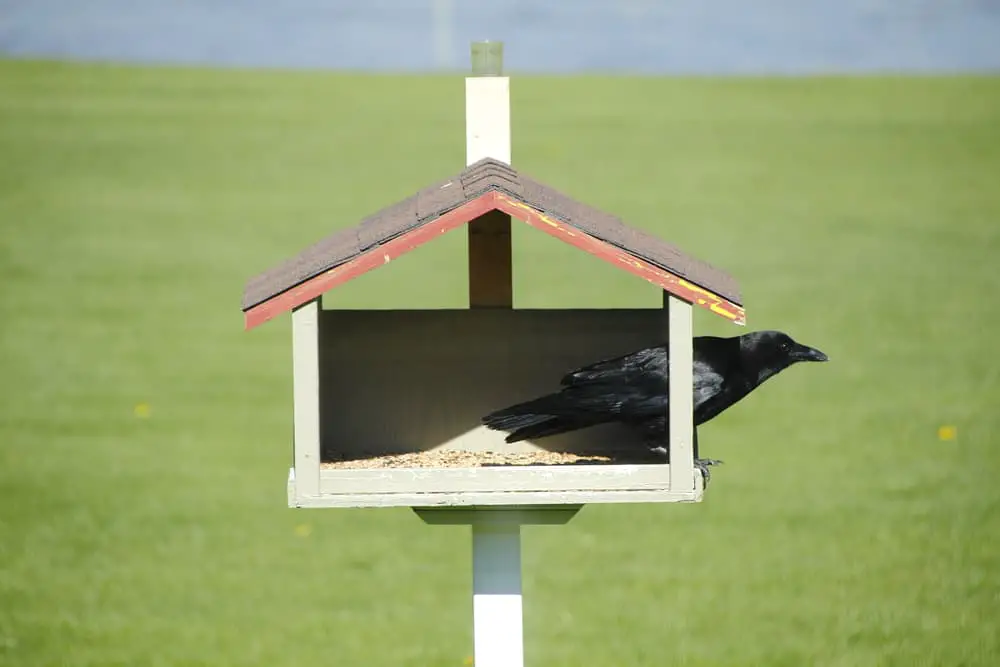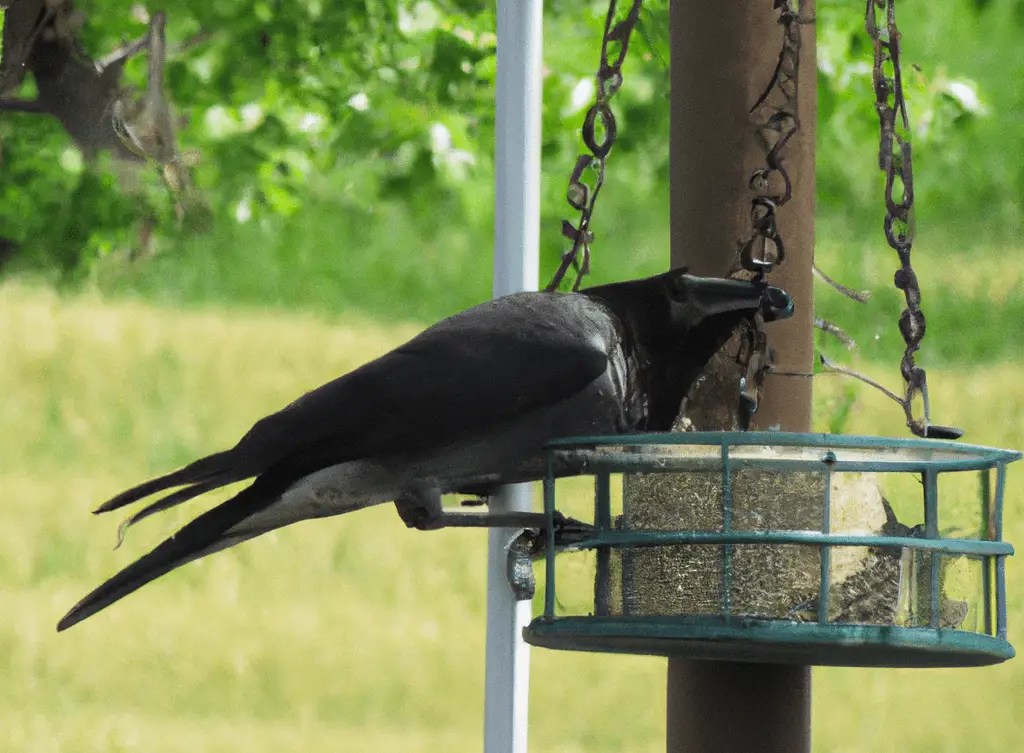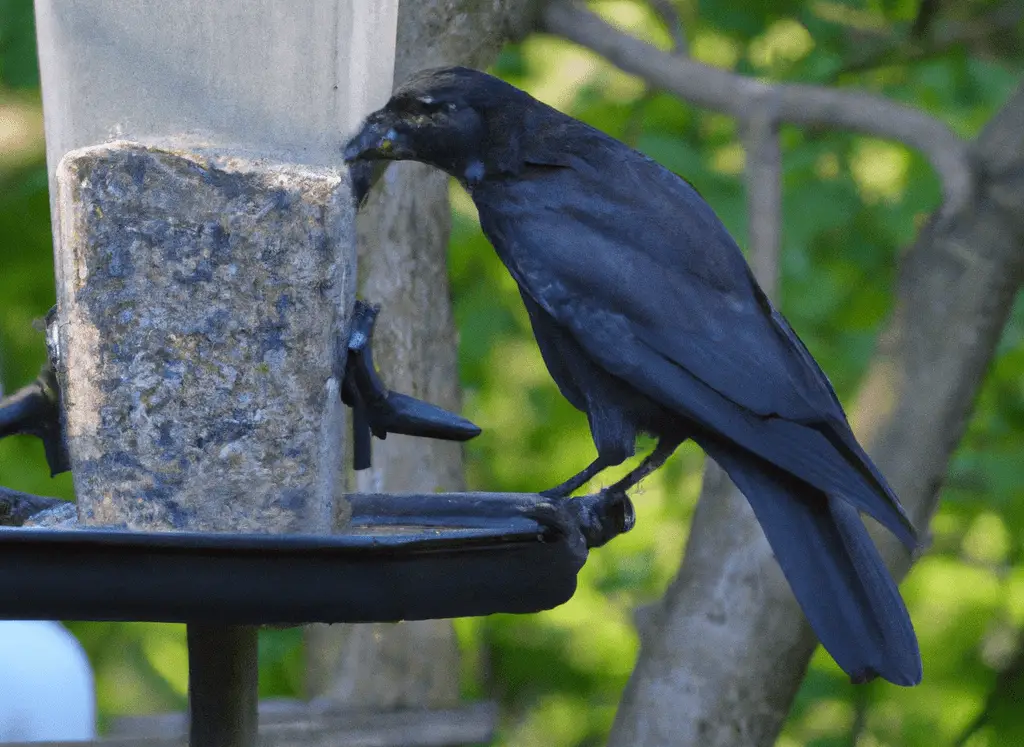Crows are considered one of the most intelligent birds and can be a doozy to keep out of your garden. In most cases, the best solution to get rid of unwanted pests is to keep your yard clean of trash and other food sources that might attract a crow. But does that also mean to avoid these pesky birds, we can’t leave out bird seeds or top off bird baths for the rest of the bird family members?
Bird feeders are a hot topic in yard care because while they bring beloved birds that sing and flit around in the sunlight, unwanted birds and other pests like rodents will be attracted to the bird food. The real question is, can you possibly invite desired birds into your yard and exclude the larger birds and the more aggressive animals? Let’s find out!
Keep Crows Out of Your Lawn and Garden with These Techniques
There are tons of methods to keep crows from ever deciding to land on your property. While some yards may have very few run-ins with crows, other locations can be swarmed often, and it may seem impossible to keep them out of your gardens altogether. Houses near agricultural lots and homes that have tall trees are the most likely places crows will want to dwell.
Below are several techniques that can be used to scare and prevent crows from damaging your property. Unfortunately, most of these methods are indiscriminate and will scare away all types of birds and most other wild animals as well. A good option is to implement these tips to remove large amounts of annoying birds from your yard and then slowly invite desirable birds back into your garden while blocking a few crows that try to return.
| Deterrent | Effectiveness | Placement |
| Scarecrows | Somewhat Effective | In gardens |
| Windchimes | Somewhat Effective | Near roosting places |
| Crow Distress Call | Somewhat Effective | In gardens |
| Crow Predator Decoy | Somewhat Effective | Near roosting places |
| Loud Noises | Somewhat Effective | Near roosting places, agricultural lots |
| Motion activated Sprinkler | Somewhat Effective | In gardens |
| Shiny Objects | Somewhat Effective | In gardens |
| Bird Wire | Somewhat Effective | Near roosting places |
Scarecrow
One of the oldest pest repellents known to man, the scarecrow convinces would-be pests that we are in our yards working. Since crows prefer to do their pillaging when we are absent, the presence of a scarecrow will deter crows for a few hours. In order for a scarecrow to work on clever birds like crows longer than that, it will need to move automatically or be moved regularly to mimic normal human activities.
Scarecrows don’t only block unwanted animals, though. Sometimes the birds we want around our gardens will be deterred as well, and then they may choose another yard to spend their time in. Timing the movement of the scarecrow to face where the annoying birds roost in the morning and evening can keep crows out while leaving most of the lawn open for other smaller birds to enjoy.
Wind Chimes
Another tried and true crow deterrent, the wind chimes make noises that most birds find undesirable and can help keep them out of your gardens. Unfortunately, the clunking and chiming will also render your bird feeder useless, as it will scare away most songbirds, and only the boldest rodents will be left to mess up your lawn. If you want to get rid of crows but not hummingbirds and other small avian feeders, you can strategically place wind chimes to keep crows out.
The best way to use wind chimes is to place them near where crows would roost or congregate instead of trying to place them where birds feed. Most of the time, crows, who are very social birds, will spend time observing the food source and consulting with other crows as to how to eat the food before approaching. If you make it difficult for them to communicate with loud chimes, they may try to go somewhere a little less noisy for their lunchtime conversations.
Crow Distress Call
Audio recordings can be hooked up to solar-charged speakers and play regular distress calls made by a crow in trouble. Other crows in the area will try to avoid the danger and may give your yard a wide birth keeping your plants safer from pest damage. Any bird smaller than a crow will also avoid the area, and your bird feeder will once again sit neglected unless an appropriate strategy is implemented.
Saving a crow distress call for certain times of the day may prove the most effective and impact other bird species less than trying to use it all day. Limited blasts of distress will cause uncertainty in a flock and keep them from coming nearer. Try to keep the blasts short, or smarter crows will notice that no one is in danger and ignore the sounds.
Crow Predator Decoy
If the neighbors are not too fond of crow caws blasting all day, then a visual decoy is a better solution. A plastic owl or a stainless steel bird can be placed around the yard to deter crows. Mount bird decoys where crows will see them and try to move them regularly.
Some stainless steel bird decoys can move on their own using wind or mechanical parts and will work on all birds and most rodents eager to enter your yard. If you want the decoys to mainly work on crows, mount bird imposters high up where crows roost and not down in your garden where the smaller birds sing. Enough stainless steel bird decoys around your property will make pesky crows uncomfortable and want to leave.
Loud Noises
Loud sounds like fireworks and explosions can scare away crows and pretty much any other creature with ears. It is hard to think of an application in a residential lawn where audio recordings of explosions would be practical to scare off crows. Placing them near food sources might work but will be more of an annoyance than the crows themselves.
Loud noises broadcast in a field with agricultural crops is a good bird control method, and up high in tall pines or other large roost-friendly trees, they could be blared to prevent nesting. Using audio methods to scare off crows but not other birds is very difficult, so use this method only to keep crows out of more rural areas of your property and not in your main garden or lawn.
Motion Activated Sprinkler
These are pretty long-lasting deterrents that have the added benefit of watering your lawn when they are activated. Crows that land on a fence or other designated trigger points will cause water to shoot out and hit that area. Most crows will fly away from and be hesitant to return to a place that blasted them with water.
Unfortunately, with motion-activated sensors, any bird will set them off, not just heavier birds like crows. Crows are smart and social, and eventually, one of them will discover where to sit that will not set off a sprinkler. Once this is known, the birds will naturally avoid the area that triggers it and hang out comfortably on either side of it. Changing where the motion sensors face regularly can keep crows guessing and prolong the effectiveness of motion-activated sprinklers.
Shiny Objects
Despite what scientists studying captive crows determined, real crows in the wild will not collect and are not drawn to shiny objects. In fact, the inverse is true and shiny objects like party strings from party stores, reflective tape, old CDs, pie tins, and anything else that lights up in the sun will scare off annoying crows.
These objects will scare off most pests, at least until they get familiar with them and choose to ignore the flashes. If you hang these from tall trees, you can have more of an effect on crows by preventing them from roosting near your home. Reflective objects in the garden will scare even friendly birds away and will not work for very long on observant crows.
Bird Wire
A thin wire that runs an inch or two above a mounting surface can keep crows and other larger birds from sitting on structures. If crows cannot comfortably sit, roost, or scope out your yard, they may choose a new location. Installing bird wire can be tricky, so it might be good to call a pest control specialist to help you out.
Bird wire only really affects the larger birds that sit on walls and fences. Smaller songbirds that we want to attract to our yards can land on branches and wires that crows cannot. This is a very effective method of keeping crows out but letting smaller birds enjoy your yard and garden. It can be used in combination with bird spikes to prevent any roosting on your home or structures.
Why Should You Remove Crows from Your Yard?

There are tons of reasons to kick crows out of your yard and very few to keep them around. They are bully birds that will harass all other species, and they make a lot of noise doing it. The incessant cawing can drive you mad and has psychological effects on household pets.
Anything growing in your garden is fair game to crows, who are opportunistic feeders and will eat anything in their path. Crows will easily damage your crops and leave your garden decimated if other food sources are scarce. Avoid letting crows into your garden at all costs.
Crows peck to get bugs and just to interact with things. They like to work on rubber seals and linings around cars and home windows. Over time these breaches can lead to costly damage and leaks. No one wants a drafty house because they couldn’t stop crows from peaking their window joints.
Crows can be a serious nuisance due to some of the health issues they cause. Crows drop a lot of droppings and feces can build up in neglected areas; eventually, these droppings can allow fungus and other types of pathogens to grow and can harm those that unknowingly inhale them. They also eat the corpses of dead animals and can leave decaying animal carcasses throughout your yard and garden, further adding to potential diseases.
Crows can be aggressive birds and may attack small pets or children that accidentally provoke them. Keeping your lawn clear of crows can help keep your yard a safe place for friendly animals to occupy. Don’t let crows take over your property to the point that no one gets to enjoy your lawn.
How Not to Remove Crows
Although getting rid of crows is important, there are some ways that you should not go about doing it. As annoying as crows are, they should not be killed with poison or bullets as they are not dangerous animals, just pesky ones. Killing crows may even be illegal in your area, so avoid it at all costs.
Crows eat lots of bad pests that could do further damage to your yard, but they also bring their own problems with them. Trapping crows is a bad idea as they will call for help, and you may be attacked by a whole flock. The only way to remove crows is to encourage them to leave on their own by making it a more hostile environment for them.
What Stops Crows at Birdfeeders but Doesn’t Affect Song Birds?

It can be hard to exclude crows from your yard, but it is even harder to keep them away from a bird feeder while letting the birds you do want around have access any time of day. Using special yard equipment and a combination of methods, you can expel crows and unwanted pests from your yard while still having a full and functioning bird feeder on your lawn.
Bird Netting
Placing bird netting around a bird feeder can sound counterintuitive at first until you realize that most songbirds are really small. These tiny birds can hop and fly through gaps that crows simply cannot enter. Choosing a four-inch netting will allow small birds through but exclude larger pests. This works for crows and squirrels equally well. Any gaps larger than four-inch netting may let crows power in and knock out seeds they can then forage from the ground.
Clean Your Yard
Crows will eat trash and anything else that is edible if given the opportunity. Yards with trash cans full of garbage and piles of refuse may attract crows more than a clean yard. Since garbage in trash bags has no impact on attracting desirable birds, cleaning it up will remove crows without affecting songbirds in the slightest. Make sure to remove all food sources while cleaning up and only start refilling a bird feeder after the crows have moved on and found a new feeding area.
Exclusion bird feeder
For bird feeder protection, it is a good idea to invest in a feeder that excludes larger birds. The easiest way to do this is with mesh that keeps crows out or pressure plates that close when crows land on them. Layering different types of netting can make it hard for bigger birds to navigate, and the pressure cage slams shut when heavy birds land but remains open for the smaller chirpers. Make sure the food cannot be spilled, or else crows will simply knock into and eat the seeds from the ground.
Fake Crow
One surefire way to stop crows from entering your yard without affecting other birds is to buy a fake crow from the party store. Mounting a fake dead crow upside down with its wings outspread sends a clear message that crows are not welcome. Make sure the crow is visible from where crows hang out and move it occasionally to make them think it is a new kill and keep them wary.
Crow Repellent
Methyl anthranilate, which is derived from grape seed, has an aroma that crows dislike. Since crows eat trash and corpses, they require a strong sense of smell. They will be deterred by unpleasant smells that smaller songbirds will never detect. Use crow repellent in places where they hang out, sit, or roost for the maximum effect on these annoying critters.




